| Article ID | Journal | Published Year | Pages | File Type |
|---|---|---|---|---|
| 6794540 | Hormones and Behavior | 2016 | 7 Pages |
Abstract
Age-related changes in reproductive hormone levels are a well-known risk factor for the development of cognitive dysfunction and dementia in women. We and others have shown an important contribution of gonadotropins in this process. Lowering serum gonadotropin levels is able to rescue cognitive function in Alzheimer's disease and menopause models, but whether this is time-dependent and the exact mechanism through which gonadotropins regulate cognitive function is unknown. We show that pharmacologically lowering serum levels of luteinizing hormone lead to cognitive improvement immediately after ovariectomy and with a 4 month interval after ovariectomy, when the benefits of 17β-estradiol are known to disappear in rodents. Importantly, we show that these improvements are associated with spine density changes at both time points. These findings suggest a role of luteinizing hormone in learning and memory and neuroplasticity processes as well as provide an alternative therapeutic strategy of menopause associated cognitive loss.
Related Topics
Life Sciences
Biochemistry, Genetics and Molecular Biology
Endocrinology
Authors
Jeffrey A. Blair, Russell Palm, Jaewon Chang, Henry McGee, Xiongwei Zhu, Xinglong Wang, Gemma Casadesus,
